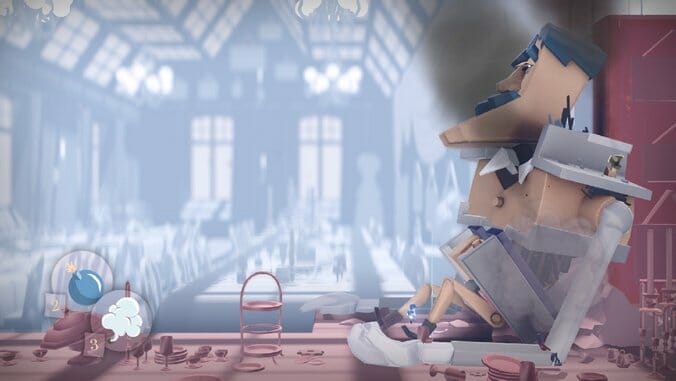Pid (Multi-Platform)

The world of Pid isn’t serene as much as it is lackadaisical and apathetic. The occupants of the remote planet where our controllable schoolboy, Kurt, has become stranded are altogether disinterested in our hero. They can mostly be found resting, and when they are found doing other things, they do so slowly and methodically, utterly without passion. The colors and hues that make up their world are damp, dark and unremarkable, though there is an inherent beauty to the world that is noticed by outsiders.
But the residents seem intent on stamping out outsiders, not by actively attacking them, but by going about their business. The first boss minds his own business when I break his dishes. His response is not necessarily to destroy me, but to clean up the mess. He approaches, sweeps beneath me, and disappears into the back. In order to get him to return, I have to break more of his dishes. He can’t even be bothered staying present for his own boss fight.
The feeling is mutual, really.
That first boss, the angry butler, is one of the worst gaming experiences I can remember having in a long time. It seems expertly crafted in order to illuminate the flaws of Pid’s design: your avatar’s sluggish movements, the slow load-time between respawns, the lazy but infinitely annoying enemy A.I. All of these things coalesce into one apathetic attack against the player.
I spent two nights trying to beat that boss, not because I lacked the knowledge of what to do, but because I simply couldn’t pull it off. I was hit by a chattering enemy, or punched by descending butler fists, or hammered by a barrage of red missiles that seem to come out of nowhere just as I am approaching the boss’s weak points. Several times I got stuck on the boss’s oddly-angled arms, desperate to get out of the way of these rockets but finding myself unable to move. Once I finally beat this boss, I played the next level for a bit until I got stuck for another hour. Then I quit the game forever in a fit of pure aggravation the likes of which I haven’t experienced since the 90s.
The journey to that first boss butler was at times beautiful and awe-inspiring. The camera often pans out to reveal that Kurt is merely a small part of a large and well-defined world. There are signs of stamped out passions and an eye toward cold pragmatism.

There are elegant puzzles that you are able to solve by using a special beam that Kurt can throw onto the ground. It lifts him up and sends him peacefully floating toward whatever might be at the opposite end of the beam. With the ability to use up to two beams at a time, there are engaging moments where the player is able to juggle beams, giving himself access to hard-to-reach areas and progressing further into the level. These puzzles are extremely rewarding.